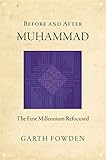Before and After Muhammad : The First Millennium Refocused / Garth Fowden.
Material type: TextPublisher: Princeton, NJ : Princeton University Press, [2013]Copyright date: ©2013Edition: Course BookDescription: 1 online resource (248 p.) : 2 mapsContent type:
TextPublisher: Princeton, NJ : Princeton University Press, [2013]Copyright date: ©2013Edition: Course BookDescription: 1 online resource (248 p.) : 2 mapsContent type: - 9780691158532
- 9781400848164
- Civilization, Ancient
- Civilization, Medieval
- Islam -- History -- To 1500
- Islam
- Islamic civilization
- HISTORY / Ancient / General
- Abbasids
- Achaemenids
- Alois Riegl
- America
- Aristotelianism
- Aristotle
- Asia
- Baghdad
- Basra
- Brethren of Purity
- Christian Bible
- Christian Rome
- Christianity
- East Rome
- Edward Gibbon
- Eurasia
- Eurasian Hinge
- Europe
- First Millennium
- Greece
- Greek philosophy
- Henri Pirenne
- Ibn Sīnā
- Iran
- Islam
- Josef Strzygowski
- Judaism
- Justinianic code
- Latin Europe
- Manicheism
- Mazdaism
- Mediterranean
- Mountain Arena
- Muhammad
- North America
- Peter Brown
- Pisa
- Qur'āan
- Roman law
- Tūs
- Umayyads
- archaeology
- architectural history
- art
- commonwealths
- empires
- exegesis
- late Antiquity
- late antique studies
- monotheism
- patristic Christianity
- philosophy
- rabbinic Judaism
- salvation
- translation
- 297.09 23
- DS37.7
- online - DeGruyter
- Issued also in print.
| Item type | Current library | Call number | URL | Status | Notes | Barcode | |
|---|---|---|---|---|---|---|---|
 eBook
eBook
|
Biblioteca "Angelicum" Pont. Univ. S.Tommaso d'Aquino Nuvola online | online - DeGruyter (Browse shelf(Opens below)) | Online access | Not for loan (Accesso limitato) | Accesso per gli utenti autorizzati / Access for authorized users | (dgr)9781400848164 |
Browsing Biblioteca "Angelicum" Pont. Univ. S.Tommaso d'Aquino shelves, Shelving location: Nuvola online Close shelf browser (Hides shelf browser)

|

|

|

|

|

|

|
||
| online - DeGruyter Restoring the Lost Constitution : The Presumption of Liberty - Updated Edition / | online - DeGruyter State of the Union : A Century of American Labor - Revised and Expanded Edition / | online - DeGruyter The Plum in the Golden Vase or, Chin P'ing Mei, Volume Five : The Dissolution / | online - DeGruyter Before and After Muhammad : The First Millennium Refocused / | online - DeGruyter Lobbying America : The Politics of Business from Nixon to NAFTA / | online - DeGruyter Recursive Models of Dynamic Linear Economies / | online - DeGruyter Secrets and Leaks : The Dilemma of State Secrecy / |
Frontmatter -- Contents -- Prefatory Note and Acknowledgments -- Abbreviations -- Chapter 1. Including Islam -- Chapter 2. Time -- Chapter 3. A New Periodization -- Chapter 4. Space -- Chapter 5. Exegetical Cultures 1 -- Chapter 6. Exegetical Cultures 2 -- Chapter 7. Viewpoints Around 1000 -- Prospects for Further Research -- Index
restricted access online access with authorization star
http://purl.org/coar/access_right/c_16ec
Islam emerged amid flourishing Christian and Jewish cultures, yet students of Antiquity and the Middle Ages mostly ignore it. Despite intensive study of late Antiquity over the last fifty years, even generous definitions of this period have reached only the eighth century, whereas Islam did not mature sufficiently to compare with Christianity or rabbinic Judaism until the tenth century. Before and After Muhammad suggests a new way of thinking about the historical relationship between the scriptural monotheisms, integrating Islam into European and West Asian history.Garth Fowden identifies the whole of the First Millennium--from Augustus and Christ to the formation of a recognizably Islamic worldview by the time of the philosopher Avicenna--as the proper chronological unit of analysis for understanding the emergence and maturation of the three monotheistic faiths across Eurasia. Fowden proposes not just a chronological expansion of late Antiquity but also an eastward shift in the geographical frame to embrace Iran.In Before and After Muhammad, Fowden looks at Judaism, Christianity, and Islam alongside other important developments in Greek philosophy and Roman law, to reveal how the First Millennium was bound together by diverse exegetical traditions that nurtured communities and often stimulated each other.
Issued also in print.
Mode of access: Internet via World Wide Web.
In English.
Description based on online resource; title from PDF title page (publisher's Web site, viewed 30. Aug 2021)


